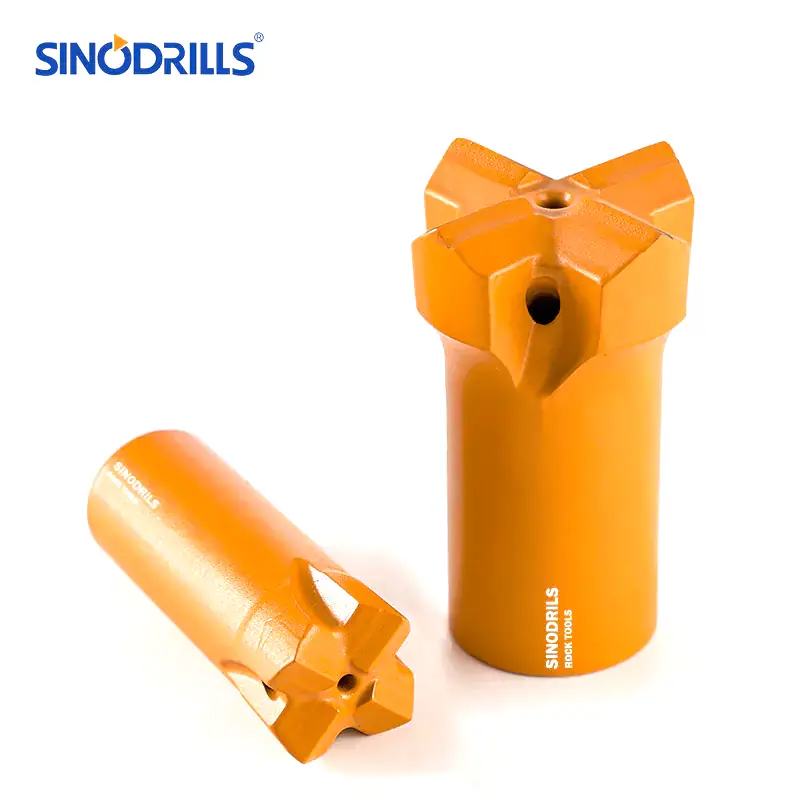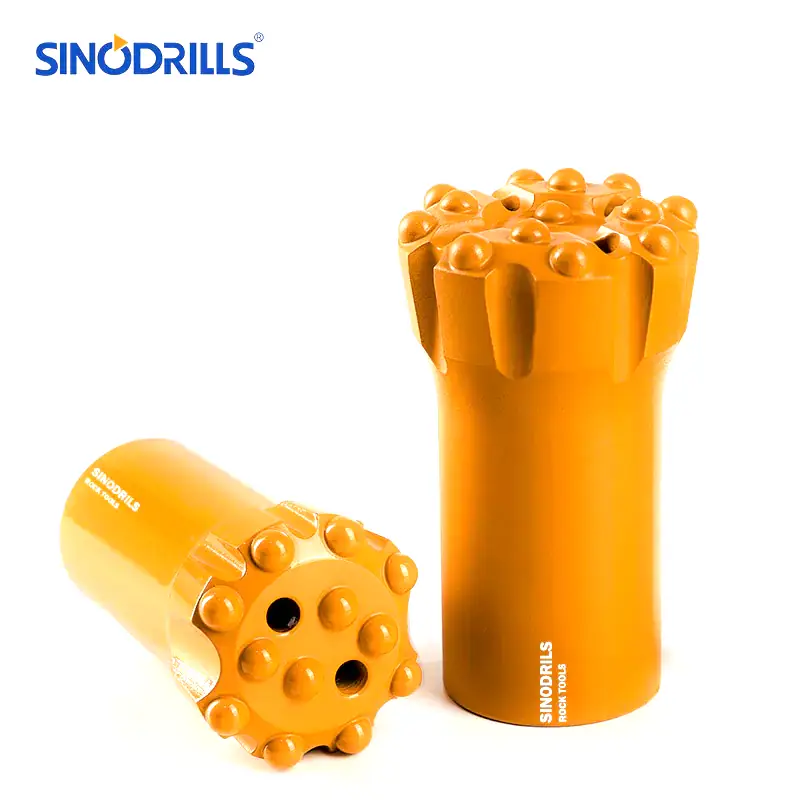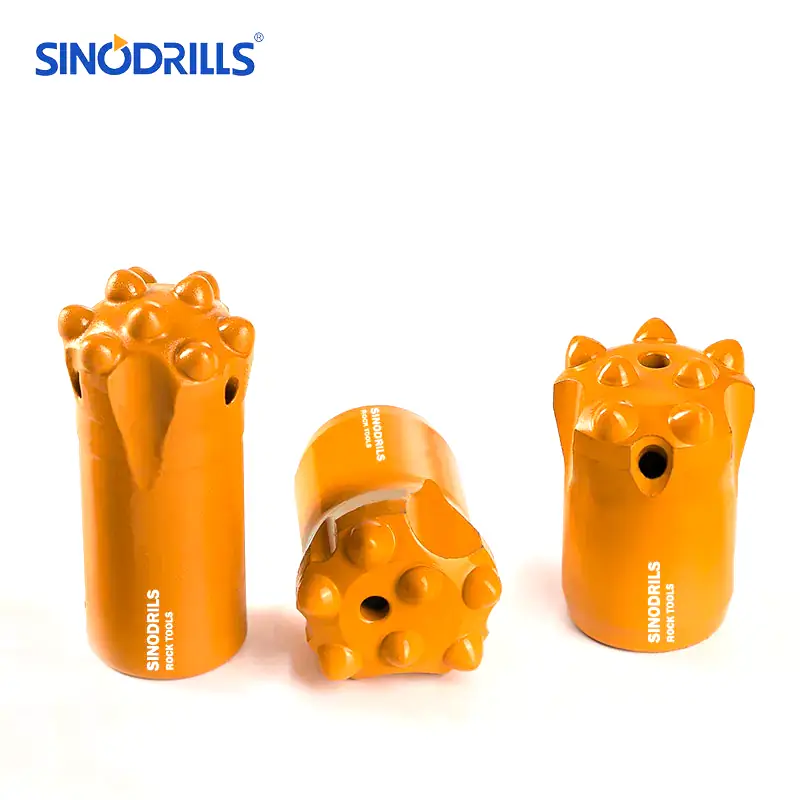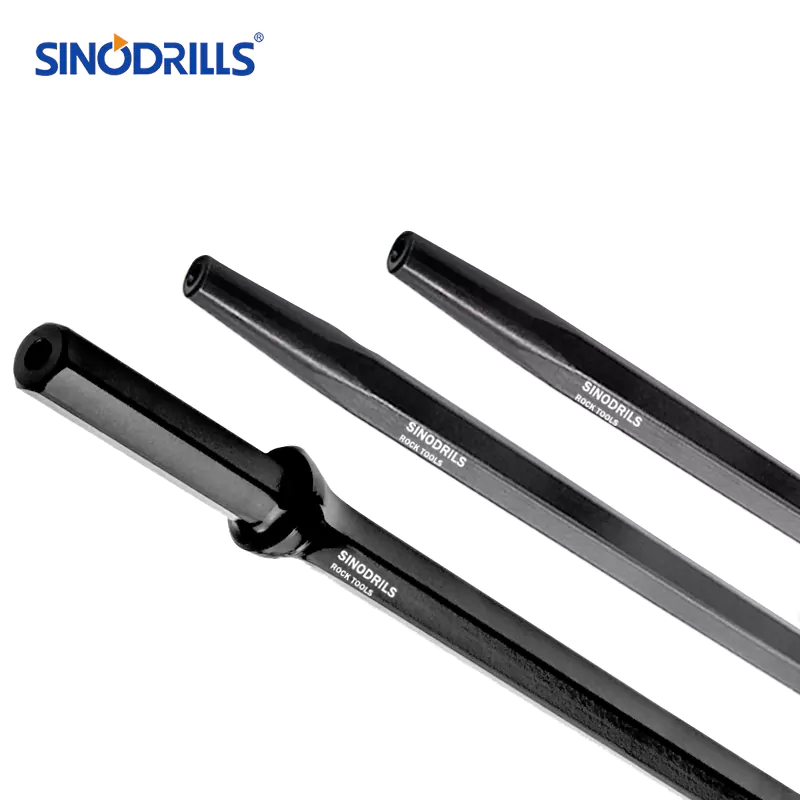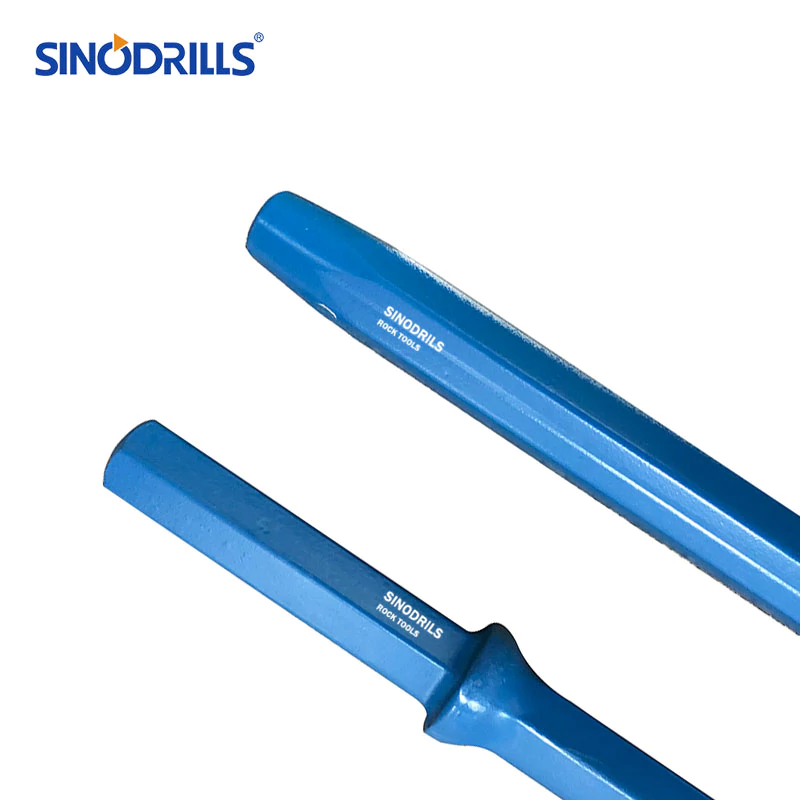In the world of Horizontal Directional Drilling (HDD), the choice of tooling can significantly impact the success of a project. Among the most crucial decisions is selecting the right drill bit. Two common options, Thread Bits and Tapered Bits, serve different purposes and excel in distinct applications.
Understanding the fundamental differences between these two bit types—from their connection methods to their performance characteristics—is essential for maximizing efficiency and ensuring a clean, accurate bore. This guide will help you navigate their unique features to make the best choice for your next drilling job.
What are Thread Bits?
Thread drill bits are a type of drill bit used in horizontal directional drilling (HDD) that feature a threaded connection. This design provides a strong, secure, and permanent-style connection directly to the drill rod or a threaded adapter. Thread Bits are generally preferred for demanding applications, such as drilling through hard rock formations, because their robust connection can withstand high torque and resist loosening under intense vibration.
- Secure Connection: The threaded design creates a tight, mechanically locked joint that minimizes the risk of bit loss downhole.
- High Torque Capacity: They are built to handle the high rotational forces required for drilling through dense and abrasive materials.
- Durability: The robust construction and strong connection contribute to a longer lifespan, reducing the need for frequent replacements.
- Reliability: The dependable connection ensures consistent performance and reduces the chance of operational failure in challenging ground conditions.
What are Tapered Bits?
Tapered Bits, also known as quick-connect bits, are a type of drill bit used in horizontal directional drilling (HDD) that feature a conical or tapered connection. Unlike the screw-in design of threaded bits, tapered bits are designed to be hammered or pressed into a corresponding tapered connection on the drill rod. This allows for extremely fast and simple bit changes in the field, making them highly efficient for jobs where the ground conditions vary and require frequent bit swapping.
- Fast Connections: The tapered design allows for quick, tool-free installation and removal, significantly reducing downtime.
- Convenience: They are ideal for projects that involve drilling through different soil types, as the bit can be easily changed to suit new conditions.
- Cost-Effective: The speed of bit changes can lead to increased productivity and lower labor costs on certain projects.
- Versatility: Tapered bits are available in various styles to handle a wide range of soil, clay, and sand applications.
Thread Bits vs Tapered Bits
When choosing drill bits for horizontal directional drilling, a key decision is between Thread Bits and Tapered Bits. Each has a distinct design and is suited for different drilling applications and ground conditions.
Connection Method
Thread Bits connect to the drill rod via a secure, screw-on threaded joint. This mechanical connection is exceptionally strong and provides a tight, reliable fit. The threaded system ensures that the bit remains securely attached under high torque and stress, which is crucial for drilling through difficult rock formations. This method minimizes the risk of the bit detaching downhole.
In contrast, Tapered Bits use a conical, or tapered, connection that is driven or hammered into a matching socket. This design allows for a friction-based fit rather than a mechanical lock. The quick-connect nature of Tapered Bits makes them ideal for jobs that require frequent bit changes, as they can be swapped out very quickly without the use of specialized tools, thus saving significant time.
Drilling Application
Thread Bits are the go-to choice for heavy-duty drilling applications. Their robust connection and durable construction make them highly effective for boring through hard, consolidated rock, granite, and tough ground conditions. The secure threaded connection ensures that the bit can withstand the high rotational forces and impacts associated with drilling through such challenging materials without risk of failure.
Tapered Bits are better suited for less demanding drilling applications, particularly in softer soils like clay, sand, and gravel. Their primary advantage lies in their speed and ease of use. While they can handle some light rock, their friction-based connection is not designed for the extreme torque and vibrations encountered in hard rock, making them a more efficient choice for projects where speed and frequent bit changes are a priority over brute force.
Torque and Stress Handling
The threaded connection of Thread Bits provides a superior ability to handle high levels of torque and axial stress. The mechanical lock distributes force evenly, making it highly resistant to loosening from vibration and heavy loads. This reliability under stress is a key reason they are used in high-power drilling rigs where significant force is needed to break through dense rock.
Tapered Bits have limitations in handling extreme torque. While they provide a firm connection, the friction fit can be susceptible to loosening or failure under severe torsional stress or heavy impact, particularly in tough ground. Their design is more focused on efficient, medium-duty work rather than the high-stress, high-torque applications where Thread Bits excel.
Efficiency and Ease of Use
Changing a Thread Bit requires more time and effort, as it must be carefully screwed and unscrewed, often with a vice or a set of wrenches. While this process is more involved, the resulting connection is far more secure. This is an acceptable trade-off for jobs where the same bit is used for extended periods without frequent changes.
Tapered Bits are designed for maximum efficiency. Their quick-connect feature allows an operator to change bits in a matter of seconds by simply hammering them in or out. This speed is a major advantage on jobs where the ground conditions change frequently, and different bits are needed to maintain drilling progress, minimizing valuable downtime.
Cost and Lifespan
While the initial cost of a Thread Bit and its associated tooling can be higher, its long lifespan and durability in abrasive conditions often make it a more cost-effective choice for heavy-duty projects. The robust design reduces the frequency of replacement, saving money over the life of the project.
Tapered Bits generally have a lower initial cost. However, their lifespan may be shorter when used in demanding conditions, as the friction fit can wear down over time. Their cost-effectiveness is highest on projects with softer soils where their speed and ease of use lead to significant productivity gains that outweigh any potential durability issues.
| Aspect | Thread Bits | Tapered Bits |
| Connection Method | Secure screw-on threaded joint | Quick-connect, friction-based conical fit |
| Drilling Application | Hard rock, granite, tough formations | Softer soils, clay, sand, light rock |
| Torque Handling | Excellent; handles high torque and stress | Good for medium torque; susceptible to loosening under high stress |
| Efficiency/Ease of Use | More time-consuming to change | Very fast and easy to change |
| Cost & Lifespan | Higher initial cost, but longer lifespan in harsh conditions | Lower initial cost, but shorter lifespan in demanding conditions |
How to Choose Thread Bits and Tapered Bits?
Choosing between Thread Bits and Tapered Bits for your Horizontal Directional Drilling (HDD) project depends on a careful evaluation of several factors. Selecting the right bit type is crucial for optimizing performance, minimizing downtime, and ensuring project success.
- Analyze Ground Conditions:Assess the geological makeup of your drilling site. Thread Bits are the superior choice for hard, rocky, and abrasive formations due to their secure connection and high torque capacity. Tapered Bits are best suited for softer soils like sand, clay, and gravel, where their fast-change capability offers a significant advantage.
- Consider Project Scope and Rig Size:For large-scale, high-power projects using heavy rigs, the robust connection of Thread Bits is essential for handling the extreme forces involved. Conversely, Tapered Bits are often a better fit for smaller to mid-sized rigs and utility installations where a quick workflow and frequent bit changes are more critical than maximum strength.
- Evaluate Efficiency vs. Durability:If your project requires rapid bit changes to adapt to varying soil conditions, Tapered Bits will increase your on-site efficiency. However, if your job involves continuous drilling through a consistently tough formation, the extended durability and reliability of Thread Bits will ultimately save you time and money by reducing failures and replacement frequency.
- Assess Budget and Lifespan:Consider the long-term cost. While Tapered Bits might have a lower initial price, their lifespan can be shorter in tough conditions. Thread Bits, though more expensive upfront, are built to last longer in demanding environments, making them a more cost-effective choice for heavy-duty applications over time.
Conclusion
Ultimately, the choice between Thread Bits and Tapered Bits hinges on the specific demands of your project. Thread Bits offer superior torque and robust connections, making them ideal for challenging rock formations and larger-scale drilling operations where maximum strength is paramount. Tapered Bits, with their quick-connect design, excel in projects that require rapid bit changes and are well-suited for less abrasive ground conditions and smaller-diameter bores, prioritizing speed and convenience.
Making the right selection requires a careful assessment of your drilling conditions, equipment, and project goals. A mismatched bit can lead to costly delays and premature wear, while the correct bit optimizes performance, extends tooling life, and ensures project success. By understanding the unique strengths of each type, you can make an informed decision that enhances productivity and safety on site.
No matter which bit you choose, quality is non-negotiable. For reliable and high-performance rock drilling bits, look no further than Sinodrills. We offer a wholesale selection of both Thread Bits and Tapered Bits, manufactured with premium materials and precision engineering to meet the rigorous demands of any HDD project. Contact us today to get wholesale rock drilling bits from our Sinodrills and equip your team for success.

